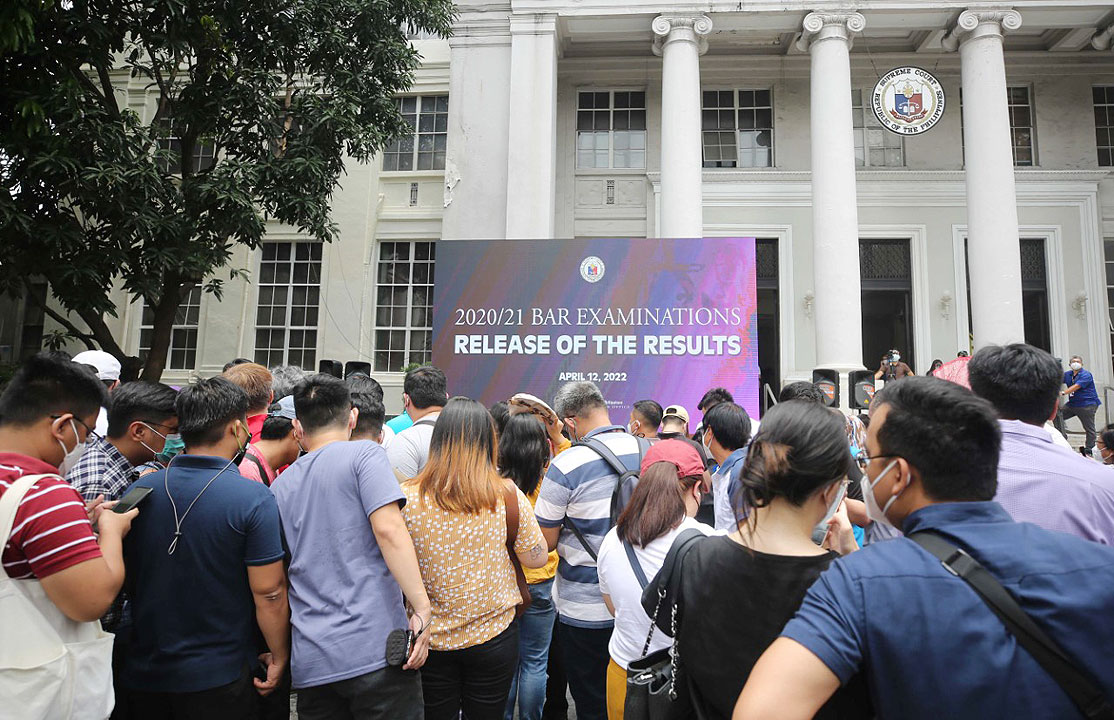
Being Right
By Jemy Gatdula

Recently, the Supreme Court announced that 3,992 law graduates passed the 2022 Bar Exams, for a passing rate of 43.47%. The new lawyers are expected to take their oaths on May 2. And like all others in the profession before them, they will be required to take the Lawyer’s Oath.
An oath says what it says.
Previously, the Lawyer’s Oath read: “I do solemnly swear that I will maintain allegiance to the Republic of the Philippines, I will support the Constitution and obey the laws as well as the legal orders of the duly constituted authorities therein; I will do no falsehood, nor consent to the doing of any in court; I will not wittingly or willingly promote or sue any groundless, false or unlawful suit, or give aid nor consent to the same; I will delay no man for money or malice, and will conduct myself as a lawyer according to the best of my knowledge and discretion, with all good fidelity as well to the courts as to my clients; and I impose upon myself these voluntary obligations without any mental reservation or purpose of evasion. So help me God.”
Did anyone notice the one word not included in that oath?
For context, here is the oath of lawyers in Singapore: “I do swear that I will well and truly serve the Republic of Singapore in the office of and I will do right to all manner of people after the laws and usages of Singapore without fear or favor, affection or ill-will. So help me God.”
The French (Paris) lawyer’s oath: “As a lawyer, I swear to exercise my functions with dignity, conscience, independence, integrity and humanity.”
The US attorney’s oath is here: “I do solemnly swear that as an attorney and as a counselor of this court I will conduct myself uprightly and according to law, and that I will support the Constitution of the United States.” (For the attorney’s oath of the 50 US States, you can find that here: https://bit.ly/Oaths_of_Admission.)
The missing word is “justice.”
Lawyers, as “officers of the court,” do not swear to do justice. In fact, the elements of a lawyer’s oath usually are three: To support the constitution, to faithfully discharge the duties of a lawyer, and to act with integrity. That’s it.
A MATTER OF JUSTICE
It does not mean that lawyers ignore justice. Filipino lawyers, as citizens of the Philippines, must adhere to the Constitution. In fact, the oath actually dictates that lawyers “support the Constitution.”
The point of not including “justice” in the oath is because lawyers (taking into consideration the generality of the ruling in Cayetano vs. Monsod) take it in their personality as “officers of the court.” As such, their main duty is to the client, to advocate for their client’s lawful interests.
Put another way, all lawyers, as Filipino citizens, are bound to the provisions, values, and principles contained in the Constitution. As citizens, they are therefore mandated to act with “justice” to everyone. The Lawyer’s Oath, however, is specific to their function as officers of the court, which is primarily to advocate for the interests of their client.
Instead, the duty to dispense justice lies with the judge. And even then, technically, the judge does not dispense justice but rather (as provided in their own oath) to decide cases: “I, _______ of _______, having been appointed _______, do hereby solemnly swear that I will faithfully and conscientiously discharge to the best of my ability, the duties and obligations incumbent upon my position; support and defend the Constitution of the Philippines; bear true faith and allegiance to the same; that I will obey the laws and legal orders promulgated by the duly-constituted authorities of the Republic of the Philippines; and that I impose this obligation upon myself voluntarily, without mental reservation or purpose of evasion. So help me God.”
The dispensing of justice (as opposed to merely deciding a case) is a complicated issue, leading to the very heart, essence, and philosophy of our Constitution, as well as the values and principles of our society. Thus, to avoid subjectivity and undue bias, to prevent individual lawyers and judges from imposing their own political views, legal philosophy, and (worse) ideologies on others, lawyers and judges are strictly enjoined to act within the parameters of the Constitution and the boundaries of legislation and measures of the elected branches of government — the legislature and executive, respectively.
AND JUSTICE FOR ALL
That is the prudent logic of the Lawyer’s Oath, the same one taken previously by thousands of lawyers during the many decades of our Republic’s life. Unfortunately, good things sometimes can’t be just left alone.
The new Code of Professional Responsibility and Accountability was recently launched and, with it, the new Lawyer’s Oath:
“I do solemnly swear that I accept the honor, privilege, duty, and responsibility of practicing law in the Philippines as an officer of the Court in the interest of our people.
I declare fealty to the Constitution of the Republic of the Philippines.
In doing so, I shall work towards promoting ‘the rule of law and a regime of truth, justice, freedom, love, equality and peace.’
I shall conscientiously and courageously work for justice, as well as safeguard the rights and meaningful freedoms of all persons, identities and communities. I shall ensure greater and equitable access to justice. I shall do no falsehood nor shall I pervert the law to unjustly favor or prejudice anyone. I shall discharge these duties and responsibilities to the best of my ability, with integrity, and utmost civility. I impose all these upon myself without mental reservation nor purpose of evasion.
So help me, God.”
The new oath expands its coverage to not only the lawyer’s function as officer of the court to that of “practicing law in the Philippines,” which (according to the aforementioned Cayetano vs. Monsod) could cover anything from the mere giving of legal advice to teaching law in the classroom. But if that were the case, then why have an oath at all for such a vastly varied set of occupations? Everyone is essentially duty bound anyway to the same demand: act according to the values and principles laid out in the Constitution. The point of having a separate oath for lawyers was to hone in on the one function reserved for them alone: to act as officers of the court.
Language and precision-wise, the first paragraph could have done with less reference to the Thesaurus: “honor, privilege, duty, and responsibility.” Each second word is essentially repeating the first. The third paragraph, on the other hand, redundantly makes a point already declared in the second.
The Oath then goes on to mention “justice.” Not once, not twice, but thrice. But what kind of justice? Value justice? Aristotelian? Utilitarian? Libertarian? Woke? Are we referring to the Catholic (original) social justice or woke social justice? Lawyers (as officers of the court) and judges (even Supreme Court justices) should not be allowed to decide for themselves what justice definition or framework they wish to employ or exclude within the confines of a court case.
And yet, even assuming the propriety of the Oath expanding to the presumably Cayetano-esque view of the practice of law itself, there is, emphatically in fact, a concept of justice embedded within the text of our Constitution and as fleshed out by legislation and measures undertaken by the legislative and executive branches, respectively (for an extended discussion on this, I recommend my own book Natural Law and the Limits of Judicial Power, published by Central Books).
OF IDENTITIES AND COMMUNITIES
And yet the new Oath goes on: a lawyer swears to “safeguard the rights and meaningful freedoms of all persons, identities and communities.” What is “meaningful freedom?” Is there such a thing as a meaningless freedom? As a legal term, it does not exist. It may be a concept found in social studies or philosophy but that’s the point: lawyers (as officers of the court) are not supposed to impose their political, social, or philosophical beliefs on others. They are merely supposed to uphold the law. Outside the courtroom and in the general practice of law, then lawyers — like any Filipino citizen — are bound to comply and uphold the provisions, values, and principles found within the text, history, and context of the Constitution.
As officers of the court, lawyers are to uphold the law without distinction, free from unlawful discrimination. Hence, equality. But now, under the new oath, they are supposed to “safeguard the rights and meaningful freedoms of all persons, identities and communities.” What could “identity” and “community” possibly mean?
Who determines what is a recognizable community or who belongs to it? Definitely not the courts. And is it right to read the foregoing in that there are “rights and meaningful freedoms” available not merely for all persons but also that specific only for “identities and communities”? But if that were so, then in the case of the latter, that actually either constitutes, a.) a redundancy, or, b.) a privilege.
Would “rights and meaningful freedoms” refer to Christians? Being Catholic, heterosexual, and having a traditional family is an identity, as well as community. Clearly the rights and meaningful freedoms of that identity must be safeguarded. Same with businessmen and capitalist entrepreneurs.
Our Constitution precisely makes the point that we have one unifying identity: the Filipino People; and one community: the Republic of the Philippines. Every citizen is subject to the same application of the law. The new Oath lends itself vulnerable to an interpretation of the possibility of groups within a group, of a balkanization of rights. The prospect of a tribalism that could only lead to division and resentment amongst our people.
Finally, the Philippines is a democratic republic. This means that we protect the rights of minorities, even if they may constitute merely 5% of the population. But that logically, sensibly, and rationally means all the more that we respect and uphold the rights and freedoms of the 95% majority. To do otherwise would be sheer extremism.
A COUNTRY IS NOT A LAB EXPERIMENT
This is why, by sheer dint of long constitutional, political, and practical experience we have made the emphasis of our law the diffusion of and hence separation of powers, the equal application of laws, and the studied and open discussion of legislation exclusively within a legislative body prudently divided into two chambers to encourage pondering and restraint.
It’s very easy, in fact tempting indeed, to tinker and experiment with measures allowing for expressions of diversity, inclusion, and equity. Anyone with a Facebook page can do that. What is inevitably difficult is to deal with the foreseeable and unforeseeable consequences of those measures.
That is why good governance is better left in the hands of serious people, working within the constraints of experience and reason, and tempered by the humility of knowing that the reality of human existence is so complex that changes needed to be done deliberately and with caution.
Lawyers have a very important and substantial role in nation building. But only if they can readily identify the specific role they have to play. It isn’t helped if they have to swear to an oath that is as ambiguous as it is difficult to understand.
Jemy Gatdula is a senior fellow of the Philippine Council for Foreign Relations and a Philippine Judicial Academy law lecturer for constitutional philosophy and jurisprudence.
https://www.facebook.com/jigatdula/
Twitter @jemygatdula